#and why did they take in Perseus and Danaë?
Explore tagged Tumblr posts
Text

Constructing Dictys and Clymene’s love story + backstory as we speak
#where is Clymene from?#we don’t even get a parentage or anything about her#was she perhaps a noble woman?#did she marry Dictys bc he was a prince?#why did she choose to stay with him when he decided to become a humble fisherman?#was it even his decision to begin with?#and why did they take in Perseus and Danaë?#so many questions…#greek mythology#ancient greek mythology#greek pantheon#perseus#Danae#Danaë#Dictys#clymene
54 notes
·
View notes
Note
Why is Hera so hostile to Leto in a manner that she isn't with the other lovers of Zeus? I can't think of any other woman who was targeted so much by Hera. One could say she didn't want Leto to give birth because her children would be a competition to Hera's children, but why bother her even after she had already given birth? Is it because Leto herself is also a threat to Hera?
Sort of I guess?
I don't think Leto would ever be a threat to Hera's role as the queen of the gods but Hera might see her as a competitor for Zeus' affection, even though I think Zeus would not marry someone else and replace Hera.
The twins are definitely a big reason why Hera begrudged Leto - it is outright stated in the Callimachus Hymn to Delos that the reason Hera especially targeted Leto was because she was told that Apollo would be dearer to Zeus than Ares is. Zeus is very proud of Artemis as well. As he himself puts it, he doesn't mind facing Hera's wrath for children like her.
But the continued hatred even after the birth of the twins (like sending Tityus to rape Leto) could have been for different reasons. This wasn't like one of those affairs Zeus would have with mortal women where he'd leave them behind once the child is conceived. Neither could Hera, despite her many attempts, get rid of Leto like she did with the other lovers. Not only did Leto give Zeus children that he loves dearly, she also stayed on Olympus despite Hera's hatred towards her (which isn't directed to any of Zeus' other divine mistresses, btw). It might have also been because Leto herself is dear to Zeus, if the way she's treated on Olympus is any proof. In the Homeric hymn to Apollo, Leto stands next to Zeus - in the Olympian assembly - to welcome their son. Hera is completely absent from the scene, as if Leto had taken her place even if temporarily. Now you could say this is because Apollo himself is such a powerful and glorious son in a way that no other son of Zeus is, so of course Leto would get such an honor (the hymn itself presents it this way).
But here's another instance - in the Iliad, when Hera goes to seduce Zeus, he is obviously very smitten but before getting into the action, he lists some of his lovers (I believe these were his favorite lovers, as a lot of others are not mentioned):
"for never has such desire for goddess or mortal woman so gripped and overwhelmed my heart, not even when I was seized by love for Ixion’s wife, who gave birth to Peirithous the gods’ rival in wisdom; or for Acrisius’ daughter, slim-ankled Danaë, who bore Perseus, greatest of warriors; or for the far-famed daughter of Phoenix, who gave me Minos and godlike Rhadamanthus; or for Semele mother of Dionysus, who brings men joy; or for Alcmene at Thebes, whose son was lion-hearted Heracles; or for Demeter of the lovely tresses; or for glorious Leto; or even for you yourself, as this love and sweet desire for you grips me now.’ (Book 14, trans. A. T. Murray)
Notice how when talking about most of them, he also mentions the children they bore to him but when Demeter and Leto are mentioned, he doesn't bring up their children at all despite them being some of the most accomplished kids of his. What's more, he takes Leto's name just before Hera's. I mean, this is an interpretation but it looks like not only did Zeus love Leto the most out of all his mistresses - giving her a place second to that of his wife, but also his love for her wasn't necessarily only because she gave him two amazing children.
Nonnus does something similar in the Dionysiaca (but this time Zeus is enamored with Persephone instead of Hera) but more notably, when Typhoeus attacks Olympus and Zeus is discouraged, Nike takes the form of Leto to encourage him and it's pretty telling of what Leto meant to Zeus.
One interesting similarity between Hera and Leto is that they both had a giant try to rape them. Porphyrion tried to violate Hera (Zeus inspired him to do this) and Tityus tried to violate Leto (upon Hera's order). Though both of them were killed, only Tityus got an eternal punishment in Tartarus of having his liver/heart eaten out by vultures so Zeus seems to have taken a greater offense at Tityus trying to assault Leto.
Again, I don't think Zeus would ever take anyone other than Hera as his permanent wife - she is irreplaceable to him. There's an entire myth about Hera leaving him and Zeus winning her back. Their relationship is obviously complex and involves all kinds of emotions including love and hate. But Leto is continually dear to him as well and that's something Hera can't do much about.
#Zeus#Hera#Leto#if you think about it Leto is like the opposite of Hera#she is a great mother#she bore children that Zeus is actually proud of#she never rebels and even begs for forgiveness when her son rebels against Zeus#she's generally mild natured and never lashes out#also if you look into this obscure myth of how Hera established an altar in the name of Leto#because Leto's name was used to cover up the secret relationship between Zeus and Hera#(which kinda sorta implies that Zeus was *maybe* courting or even married to Leto at that time)#it all gets even more complicated for both Hera and Leto#ALSO in the texts that record the syncretism bw Greek and Egyptian gods#Some authors make Hera the mother of Apollo#and Leto was Apollo's nurse#Those texts also mention that this Apollo defeated Typhoeus and became the king of Egypt#So he was like the ideal son of Zeus and Hera#And it's so interesting to me#how this Apollo - the perfect son of Hera - transitioned into a sort of rival figure to Hera in the greek myths#and Typhoeus who was defeated by Hera's son became the son of Hera in the Greek myths#on a different note#to this day I can't understand why Zeus would inspire Porphyrion to do such a thing#was it to get back at Hera for the Tityus incindent?#I shall headcanon it that way (even though I prefer to ignore this version)#well of course not that Zeus would have ever let Porphyrion actually have his way with Hera regardless of the reason#but yeah that was such move and it's wild that the mythographer didn't tell us that reason behind Zeus' action#I've also seen people hc that it was because Zeus wanted Heracles to save Hera so that she's accept him finally#which is also an interesting explanation#especially if you consider that Heracles was also given Hera's breast milk (without her consent)#anyway that's enough rambling ig
159 notes
·
View notes
Text
“Why do people feel bad for Medusa?”
...because she got killed for someone else’s happy ending
Why is that so hard to understand?
While yes, Medusa was a hideous terrifying monster, why did she deserve to die if she wasn’t going around abusing those deadly eyes of hers and stayed secluded to prevent unnecessarily/unintentionally taking lives?
Ovid’s Medusa plays a huge role in people's perception of her and I won’t deny that, since he wrote her as a rape victim, who was then punished for her own rape, and got killed on top of it all. The tragedy makes sense why women find her story more upsetting and discuss her more than other sexual violence victims like Danaë and Io, who absolutely deserve more attention, but had happy endings.
Ovid’s Medusa is not how I personally see her, but something that stays the same no matter what is that she’s killed so Perseus can save his mother despite the fact she’s never done anything to harm Perseus.
Do I think Perseus deserves nuance and sympathy behind his reasons here? Yes, because it’s human to be willing to sacrifice a stranger for your loving mother
but it’s not wrong to feel bad for Medusa and think she was worthy of life.
28 notes
·
View notes
Text
Something fascinating about Perseus is that his famous journey is a stitching-together of two separate myths.
First he kills Medusa, then on the way back he takes a random diversion to slay a Ketos and rescue Andromeda. This is hardly unusual for Greek stories, which often feature random diversions, but what interested me is that both seem to actually be explanations for things rather than the usual “a hero killed a monster here and that’s why these particular random crossroads are cool and important” formula these things follow.
First, the story of Perseus and Medusa is connected to the image of the Gorgon, a heavily widespread artistic motif. The gorgoneia are hideous heads that adorn architecture, shields, and coins all over Archaic and Classical Greece. They seem to have served a similar function to gargoyles in Christian myth, driving off evil spirits with their fearsome visage. And Perseus cutting the head from Medusa was the tale of how that icon came to be. Well, that might be a bit backwards: the story would’ve been around for quite a while during the Dark Age before it was written down in the 7th century BCE, around the time those gorgoneia started appearing.
Andromeda is entirely unconnected to this except by the single thread of Perseus himself. This is epitomized, in my opinion, by the recurring indecision over whether Perseus killed the ketos with his sword or with Medusa’s head. Did he even have Medusa’s head in the early tellings of the story? Were they connected later? Because what’s interesting about the story of Perseus, Andromeda, Cassiopeia, Cepheus, and Cetus, is that you might recognize all of those names from the stars. Every single character in this myth was a constellation!
Except Phineas, screw him I guess.
Of note, none of the characters from the Medusa adventure are constellations. Not Danaë or Polydectes or Dictys or Medusa herself, all of whom were much more important to Perseus’s life than Cepheus who did absolutely nothing even in the one story where he matters. Unlike Heracles, whose whole life is an extended constellation myth, Perseus has this one incident, but it’s a dense one, producing five whole star formations from a single monster fight.
It’s hard to figure out when and from what this would’ve arisen, given all these transformations happened during the Dark Age before the reinvention of writing. Nonetheless, this is a great example of the evolution that I find incredibly compelling about studying mythology. Every tale has its seams, stitches haphazard or clean, reminders that this was a living culture and all of these stories we might fall into the trap of treating as fun fictions with quirky characters were as real as any of our modern religious texts and histories.
68 notes
·
View notes
Note
Hello hello, hi, I saw your “if we’re going to do Medusa x ___ can it be Medusa x Danaë” post and got interested.
Being honest, I do not know Perseus (or any of the Greek heroes— man I have to change that-) well other than the general synopsis. So I know even less about Danaë other than her being pursued for her hand in marriage
So I’m moreso wondering how they’d come to be/work out, if you don’t mind me asking
ngl this is a hard awnser to question I had to rewrite my answer like 4 times but uuhhhhhhhhh tbh a issue is that perseus doesn't actually meet medusa, considering her power he just kills her in her sleep. Obviously the whole trope of medusa is awake and just tells perseus what her deal is seems to be at least efficient but over-dramatized. one look at the reflection and bro sees a victories secret model lady if were going with that damn I guess it depends on the tone of the story, lighthearted? perseus is collecting moms like pokemon bro already was raised by two moms somtimes GET THIS KID A THIRD, of course perseus would be as young as possible, which I think Is like 13 or 14. medusa is the step mom that stepped up, but the third on to do so in a row so not very special lmao, "who the fuck is this child" doesn't take a genius to realize its a suicide mission. medusa throwing perseus at cetus like a pokemon. course the more serious version is probably like something about danae being thrown into the ocean in a chest to die after being zeus'ed and medusa being cursed and something something unity between victims and da struggle, medusa probably realizing there are woman (danae) who did and do have it worse than her and that she should use her power to help others instead of hanging out with her sisters waiting for evil kings to send children to die. probably medusa taking perseus place in a lot of these stories, kill her way into danaes heart (more than one crazy tyrant to kill). sometimes perseus kills cetus (big ol sea monster) just with a sword so not much about that changes unless medusas there than I guess honestly the cetus Andromeda thing really does kinda end up being like a different myth, a separate task and adventure. hell I think you can place it before him meeting medusa and not much would change.
ovids medusa and danae sadly have alot in common but one thing that's not sad is that both seem to want to live simple lives. its hard to characterize medusa you can basically do whatever which its probably why shes so popular honestly.
bassically two milfs yuri
now i must go rip up soda cans with my hands into little pieces
21 notes
·
View notes
Text
Now let's talk about Proteus, and the whitewashing of his character and action in Shadow of Perseus!
First of all, here Proteus and Danaë have a healthy, beautiful uncle/niece relationship in this retelling, despite the fact that in the original myths he straight-up assaulted her, to the point where it is theorized that the reason why Acrisius didn't believe Danaë when she told him she's pregnant with Zeus' son is because he believed the child belonged to his brother. As disturbing and gruesome as it is, it would've been much more complex and nuanced to keep Proteus as the depraved fossil he was all this time. It becomes a much better commentary on CSA and rape, especially considering the fact that the majority of abuses usually happen inside the family, hence why most stories don't end up being revealed or told. It could also be linked to the question: "How far can someone go just to take revenge?", because what if the reason why Proteus assaulted Danaë was because he wanted to leave her pregnant with a son that could kill Acrisius? But because Proteus still shows love for his twin brother whereas he's depicted as the ultimate Ax-Crazy guy out there this entire idea never got put on paper.
Next we have Proteus' sad background, more specifically how he lost one of his daughters and his wife because of a fever. Nowhere we're told about how Bellerophon, nor about how he tried to murder him along with his father-in-law because his wife falsely accused him of rape, because such a scenario would've put him in a totally bad light!
Turning back to my previous point about abuse, the fact that Proteus has a good relationship with Danaë to the point where he acts more like a father-figure towards her than Acrisius himself AND is willing to give his kingdom to Perseus directly straight-up erases importance and significance of what should've happened once Perseus reached Tiryns, named that he killed Proteus purely because he raped his mother years ago, even though in this case he never really met him, unlike Polydectes whom he knew much better. There's also something poetic in the fact that the original Perseus was willing to forgive his grandfather for what he did and chose to rule over Tiryns after his death because he was too ashamed of taking the kingdom of a man he murdered, but didn't have the exact same moral or ethic problems when it came to Proteus' murdering, simply because he couldn't forgive him. But this book twisted these figures personalities, ambitions and purposes to the point where the entire plot becomes nonsensical because the author was too cowards to adress the actual violent misogyny from the myths and how it truly impacted these figures, and preferred to demonize the one guy who stood up for the victims and avenged them for a feminist commentary instead.
12 notes
·
View notes
Text
the ballad of andromeda, excerpt 7: you will save three women before the sun has set
hi. hello. so this is very overdue, but I really think its one of my best excerpts. its got action, its got profanity, its got badassery, its got murder!
this excerpt ties together the main cast of the myth. enter our party members: perseus, andromeda, medusa, and danaë.
i hope you enjoy <3 daph
--------------------------------------------------------------
You will save three women before the sun has set on this day, or doom them all.
Perseus had not meant to accept another quest. When he held the three fates' eye hostage in exchange for help on his quest, as grey-eyed Athena had instructed him, he envisioned receiving an enchanted sword that always found its mark or a magical apple that would increase his strength. He did not anticipate a prophecy.
Three women, he thinks. He already has a time limit on saving his mother. How is he supposed to save two other women before the day is done?
He should have told the fates where to shove their prophecy. He should have tossed their eye as far as he could, and while they were distracted, grabbed the invisibility helmet, sword, shield, pouch, and winged sandals and flew away. It is his mother's fault he has such impeccable manners not to go forth with that plan. It is also his mother's fault that even if he had wanted to ignore the prophecy, he could not, as he would never abandon anyone in need when he might be able to help.
One must be my mother, he reasons, tightening the straps of the shield on his forearm as he flies across the mountain range.
I only have to help two other women on my way back to mother, he concludes. Nothing will change.
Far above the mortal man flying with wings on his sandals and invisible for a time from the eyes of man, the stars watch on. They see the thread that has been woven for this young man and where it will lead him in the next hours. They hear his thoughts.
Nothing will change.
The stars gave a great, hearty, joyous laugh.
And watch on.
--------------------------
You are different, Medusa whispers, standing above him. He remains on the ground kneeling, eyes closed, head bent over his empty fists resting on the dirt in front of him. His shield remains strapped to his left forearm, and his sword lays beside his right hand on the ground, where he set it. The gorgon had not spoken for several minutes after he had given up. She merely stood over him in silent contemplation, the only noise in the cave being the hissing of her snake hair.
Why did you come? She asks.
Eyes closed, head bowed, he gives her the truth. He recounts his mother's imprisonment, sentenced by her father, and his non-consensual conception from the king of the gods. He describes the box he and his mother were trapped in for weeks on the sea. He speaks of the fisherman Dictys, of his kindness and love towards him and his mother. About king Polydectes’ obsession with his mother, how he had agreed to give the king anything to spare his mother, and how the king had sent him on an impossible quest to retrieve the unattainable - Medusa's head.
Ahh, the gorgon signs as he finishes his tale. You have come for my head.
No, he insists for the second time since entering her cave, I will not take your head.
Then, instead, will you take me? The gorgon asks quietly. He lifts his head and looks at the gorgon in surprise. And that would have been the end of his life had the gorgon not also been kneeling on the ground, head bowed, eyes closed, before him.
My lady? He asks, closing his eyes again; I do not understand.
Will you take me with you? To your home and to your mother? You are kind - kinder than any man I have ever encountered, and I can only imagine the type of woman your mother is. I am lonely in this cave, scared. They will continue to come until I am dead. But if I flee and return home with you, I will kill the king for you, and I will find a new home, and no one will ever find me.
Yes, he answers without thought. As if there is any other answer he could give to someone asking for help. Ah, he realizes as he stands and turns, replacing his sword into its sheath and tightening the sack tied to his belt that carries the helmet of invisibility; Medusa is one of the women I will save.
Ridiculous, he thinks as he motions for the gorgon to climb onto his back. She wraps her legs around his torso and her arms around his neck. He can feel her snakes slithering on his shoulders and the base of his neck. She is the one who is saving me.
High above, the stars watch these two fates weave together. The beginning of a beautiful future.��
They watch on.
--------------------------
Perseus hears her before he sees her.
He almost mistook the screams for the waves crashing angry and restless upon the jagged edges of the cliff until he felt someone shake his shoulder.
Listen, Medusa hisses, leaning forward from where she held onto his back; a woman is screaming.
He listens. Faintly, under the crash of the water and the birds that dive for the waves, he could make out the sound of a woman's voice. He flew along the cliff face, searching for the source of the screams.
YOU BASTARDS! He hears shouted from further ahead of him and the gorgon. He continues to fly towards her voice as she continues, DO NOT LOOK AWAY! SEE ME! YOU DID THIS TO ME! AND NOW YOU WILL WATCH WHAT BECOMES OF ME!
Where are you? He pants, desperately searching the cliff face.
THERE! A clawed talon shoots past his face as the gorgon points downwards. Jutting out from the cliff face, barely wide enough to stand on, is a portion of rock that currently holds a woman. Something flashes and catches his eye. Gold chains run from the rock ledge the woman stands on up to her wrists, which are encased in cuffs.
And they say I am a monster, the gorgon scoffs, staring at the chained woman.
He could not look away. She is soaking wet. Her hair sticks in long, heavy curls across her face, arms and back. Her white dress is plastered to her body, translucent, darkening to grey as the dark skin underneath begins to bleed through. Her dress is torn at the bottom, up the centre of the shirt to her knees, both wet halves slap against her calves and the rocks, pushed back and forth by the wind.
But that is not what stops him, hovering midair. She whips her head to the side, flinging her wet hair from her face. He catches himself from closing his eyes on reflex, for her face holds the same fury as the gorgon on his back when she first appeared in his shield. Anger fills her eyes as she watches the sea, spitting out a mouthful of bloody seawater, baring her teeth. The clink of metal echoes as she pulls the chain taut, leaning forward over the ledge to shout into the oncoming waves.
CURSE YOU! She screams, with all the rage of the fiery pits of Tartarus, CURSE YOU ALL! I AM INNOCENT! IT WAS YOUR FAULT MOTHER, YOUR HUBRIS! YET I AM THE ONE TO PAY FOR IT! I MAY MEET MY END AT THE BOTTOM OF THE OCEAN, BUT YOU HAVE CHAINED ME HERE; YOU HAVE KILLED ME! YOU ARE MURDERERS!
The waves are crashing faster and higher on the rocks, being pushed by something fast approaching.
CURSE YOU POSEIDON! She continues, CURSE YOU FOR ASKING FOR AN INNOCENT TO PUNISH INSTEAD OF THE ONE WHO SLIGHTED YOU! YOU COWARD! YOU WHIMPERING, SNIVELLING, WEAK COWARD! YOU WANT TO TAKE ME? COME AND GET ME!
Holy gods, he whispered, staring in horror and awe at this woman, cursing the very god whose domain she stands chained above.
What are you waiting for? the gorgon asks, cackling with delight, enjoying the woman's blasphemous shouts; go and get her so we can return home!
He dives down towards the chained woman, the gorgon's arms and legs tightening around his neck and torso as they plunge towards the waves, straining against the strong winds.
MY LADY! he shouts, halting the wings on his sandals, grabbing the cliff's wall with one hand, hovering slightly above the woman and the waves crashing against the cliff's walls.
Hello, dear, we have come to rescue you! The gorgon adds, head tilted down and face pressed into his shoulder, hiding her eyes, as he unsheathes his sword.
WELL, HURRY AND USE THAT SWORD TO FREE ME, FOR FUC… she screams, the crashing waves cutting off her profanities. The gorgon laughs as he floats closer to the woman. She places her hands against the stone wall behind her, raising them as high as the chains will let her, pulling them taut. He moves close to her hand, gripping his sword, as he swings back and around his side before slicing it through the air, perpendicular to the top of the woman's head, and striking the chain just below the cuff. A reverberation zaps up his arm as the sword clangs against the stone.
THAT WAS MUCH TOO CLOSE TO MY HAND, YOU ASSHOLE! She screams, shaking her fist at him, the two chain links hanging off of the cuff clinking together.
Did you just call me an asshole? He demands, focusing on the next chain. I am rescuing you, and you call me names? What kind of gratitude is this?
She opens her mouth, most likely to tell him where he can shove his gratitude like any proper lady ought to when a monstrous shriek pierces his ears. He turns around, eyes on the open sea, staring as the screaming beast splashes back into the water. A moment later, it reemerges, shrieking, jumping out of the water before flopping back into the sea on its side like a whale.
IT IS CETUS! The woman yells from behind him, pulling on the chain that still holds her to the cliff. He looks back at the approaching monster, cataloguing its size. The creature's body is as wide as a temple column is tall, and if it were to stand upright on its tail, he believed the beast could reach the top of the cliff. When it opens its mouth to screech, he sees four rows of sharp teeth, as long as his sword and wickedly sharp. From the crown of its head to the base of its tail, there is a trail of large pointed scales sticking straight out of the monster's body, as thick as slabs of marble and as dark as its pitch-black eyes, which are fixed on the woman.
CUT THE CHAIN, she screams at him, CUT IT! CUT IT NOW!
Before he can lift his sword, he feels a tight squeeze on his shoulders.
You stop the sea creature; I will free the girl, the gorgon hisses, releasing her grip from around his neck. CLOSE YOUR EYES, DEAR, the gorgon instructs the woman before her legs release from his torso, and she falls. He raises his shield to gaze into, watching the gorgon land, grasping the rocks tightly as one leg falls over the platform's ledge. The gorgon crawls along the stone in front of the woman, and begins to tug on the chain, where it is attached to the cliff.
He leans forward, propelling his winged sandals to take him closer to the sea monster. He will buy the women time.
As the monster jumps from below the surface once again, he thrusts his sword, plunging it deep into the underbelly of the beast. It gives a horrible cry as the sword meets its flesh, which only increases in volume as he grips the sword tight and uses his winged sandals to push off the beast's stomach and propel backwards, ripping the sword from the monster's flesh.
However, the monster does not sink below the surface as it had before; it remains out of the water, its tail whipping through the water violently, coiling underneath the beast's enormous body like a snake. The monster swivels its head towards him, now stable on its tail, and lunges at him, mouth wide.
He dodges the monster's sharp teeth but makes an impact with the monster's head, losing his balance in the air. He splays across the beast's sleek, slippery skin, rolling head over feet as he begins to slide down the side of the beast back towards the sea. On reflex, he plunges his sword into the slimy flesh to cease his fall. But he failed to recall the earlier reaction the beast had to being stabbed. Before he can ready his feet to fly again, he is being whipped from the beast's body and flung through the air until the stone wall of the cliff stops him.
Coming out of his daze, he has just enough time to fly upwards as the monster crashes face first, teeth bared, into the stone where he was moments ago. But the creature is not deterred. It continues to chase him upwards, snapping its teeth and catching a mouthful of the Fate's untearable sack that is currently tied to his belt. He is yanked down, landing on all fours on the clenched teeth of the sea creature.
This would have been his last moments alive for the second time today, if not for the women he has encountered on his quest. Just as Cetus was about to open his massive mouth, swallowing him whole, he catches a flash of light in his peripherals. Then, there is a golden chain, dripping seawater, being whipped directly into the sea creature's eye.
The creature flinches, flinging him into a freefall as it releases a roar of pain. Out of imminent danger and the creature's focus, he catches himself, righting his sandaled feet under him, and steadies himself against the cliff face, watching as the golden chain is reeled back in by the furious woman on her ledge.
Then, the monster stops.
So quickly, if he had blinked he would have missed Cetus transforming into stone, mouth opened wide in a forever roar. But the sea creature is still moving, and he begins too as well. As gravity begins to pull the off-balanced stone giant towards the sea, he races towards the two women still standing on the jutted ledge of the cliff. Barely landing, he gets an arm around each woman's waist before he is shooting up, and up, and up. They crest the top of the cliff just as the wave does, shooting into the sky from the massive impact from the stone sea creature.
As he soars towards the directio of his home, with two of three women he is destined to save, he turns to glance at the newest member of his party. Soaking wet, with the gold cuffs still around her wrists, the woman is staring at something to the side of where they are heading. When he glances over, he spots two people, standing and watching their departcher, clad in brightly coloured clothing and extravagant jewlery. The look is complete with a circlet of gold upon each of their heads. Royalty, he surmisses.
As they continue flying away from the cliftside and the royal couple, the womans words are almost lost in the crash of the waves and the roar of the wind. But he is holding her, and he packs up her whispered farwell.
Goodbye, mother, father, she breathes into the rushing wind, may you live forever.
High above, the stars continue to watch the fates of these souls weave together. They smile at the intricate story taking shape in the tapestry these threads are weaving.
They watch on.
--------------------------
I will be deaf before we reach Seriphos, he thinks as he swoops around another mountain peak.
The woman screams at every drop, every approaching mountain, and every flock of birds passing by. The gorgon does not help the girls' fear, pointing out different obstacles that the three might crash into or how much pain they will feel if they fall from certain heights.
His arms have been numb for two hours before he sees the familiar shore of the place that he currently calls home. He flies along the outskirts of the polis, not wanting to draw attention to his companions and himself.
Medi, he whispers, taking care not to rouse the sleeping woman he carries in his arm.
Percy? The gorgon answers, voice quiet.
These are the mountains I told you of; he nods his head to the left, where several mountains form a range that circles the west side of the polis.
The mountains are too steep to climb and are too high to have much vegetation, so there is little point for the villagers to venture up, he explains.
We will scout a cave for you, perhaps near a stream, and fix you up safe and sound. No one will bother you here.
Thank you, Perseus, the gorgon whispered after a moment, for all you have done for me.
I did nothing, Medusa, he insisted, nothing other than what should be done.
Well, I thank you, nonetheless.
Several minutes passed in silence before the gorgon spoke again. And what of our rescued princess? Where will she stay?
With my mother and I, he responds immediately. Then waits for a beat. If she so desires, he amends.
My sweet boy, the gorgon snickers; she will eat you alive.
I can hardly wait, he tells the gorgon, looking down at the sleeping princess he held in his arms.
She is a good one, the gorgon continues. Anyone who is willing to tell the god of the sea to go fuck himself while standing on a cliff over said sea is worthy, in my mind.
Mine too, he admitted, though it did make my heart stop.
The gorgon chuckles; Of course it did. You care too much.
I care the right amount, he corrects, that every person should care.
If only every person were like you, the gorgon sighs, sounding far away.
At that moment, the sun passed completely behind the mountain range to their left, casting the polis in shadow.
Quickly now, my dear, we still have one woman left to save and only a small amount of time before the day is done, the gorgon reminds him, gripping his shoulders tight.
Indeed, he grins. I believe we owe the king a visit.
He could not see her face as he flew straight towards the castle grounds, but he would bet all the drachmas in his possession that the gorgon wore a delightful, wicked, eager smile.
--------------------------
Do not fear, my lady. I will protect you no matter what occurs, Perseus promises the woman he stands beside.
A soft snort comes from behind his back, likely from the gorgon he carries over his shoulder. That is not reassuring, Percy, the gorgon continues to laugh, voice muffled by the sack she wears over her head. You’ve scared the poor girl even more now. Not to fear; I will protect you, my dear.
Medi, he hisses, giving the gorgon a shake from where he holds her legs; you are supposed to be dead. Dead people cannot speak!
What a bore being dead is, the gorgon sighs, finally going limp against his shoulder and back, playing her part.
I feel very safe, the woman to his right chimes in. Thank you, Medi, for your protection. He catches her sly smirk out of the corner of his eye just as he feels a sharp talon jab at his back.
Honestly, you two, he grumbles under his breath as they reach the front gates of the palace, raising his free arm that holds his shield at the awaiting guards.
State your name and purpose, the guards demand.
It is I, Perseus, son of Danaë. I have returned from my quest, granted by our most gracious king. Open the gates so that I may bring him the monster I have slain! He boasts, flexing his muscles ever so slightly. He can almost feel Medusa rolling her eyes and is glad for the sack covering her face.
The guards stare at him in wonder, looking at the woman draped over his shoulder in fear, and quickly open the gates.
He does not wait, marching towards the castle with the woman at his side, stopping at the door.
Together, the woman at his side whispers, let us make a spectacle. Her eyes glisten with mischief as she places her hands on one half of the double doors while he places his unoccupied hand on the other and together they push open the doors at the same time. He uses so much strength that the door bangs against the wall, echoing a loud bang through the occupied throne room. He is surprised and delighted to see that the woman pushed her door so hard it too made a bang against the wall, causing the people present to grow quiet and turn their way.
Perseus strides into the throne room, straight towards the king, who is sitting atop his throne.
Come, men! Come and see! Our plight is no more! For I, Perseus, have slain Medusa and bring her body to our great king! He exclaims, reaching the bottom of the throne. As the king's men cheer, gathering to see the cursed woman, he sees his mother sitting beside the throne, watching him. He meets her eyes and closes his eyes tight, keeping them closed for a moment too long. Opening them again, his mother nods, closing her eyes tight and lowering her head to the floor, the picture of a perfect, demure, soon-to-be-wife of the king.
He stops in front of the king, bowing deep, careful of his hold on the gorgon.
My king, straightening, he stares into Polydectes’ eyes, his grin growing as the king's face turns red with fury.
I have completed the impossible quest you sent me on, he begins, removing the gorgon from his shoulder and laying her on the floor before him.
I return to claim my winnings. My mother, in exchange for the gorgon's head, he finishes, tearing the sack from Medusa's head. The men gasp as the gorgon's face is revealed, lax in presumed death, eyes closed, and telltale snake hair limp against the stone floor.
I asked for her head, the king states, silencing the whispers of his men immediately. But you have brought me all of her.
Yes, my king, he answers, I have killed her, but I thought you might like the honours of beheading the beast. He steps back, gesturing to the woman lying on the floor.
The king begins to grin as he rises from his seat and unsheaths his sword. His men cheer as he makes his way down from the throne.
I will enjoy this, the king leers, hoisting his sword high over his head, ready to bring it down on the gorgon's neck.
As will I, Perseus admits, closing his eyes tight and lowering his head, pulling the woman close to his body and pressing her face into his side, his shield arm wrapping around her back.
The screams end just as they begin. The sound of rapid retreating footfalls and swords being drawn from sheaths is replaced with a crackling noise as if sand is being rubbed against a rock. Until the only sound is the hissing of several snakes.
A moment, my dears, Medusa asks, breaking the silence; keep your eyes closed.
He hears shuffling, fabric being dragged over stone until he feels a warm hand cover his where it is resting on the hilt of his sword.
May I borrow your sword for a moment, dear? The gorgon asks.
Of course, he tells her, releasing the hilt. He feels the sword being drawn from its sheath then hears a ripping noise, as if fabric is being torn apart. His sword is placed back into his hand, and another moment of rustling passes before the gorgon tells them they may open their eyes.
Slowly, he opens his eyes and raises his head to find the throne room covered in stone statues of the king and his men in various states of destress. Their horror forever etched onto their faces. And in the midst of the stone terror, Medusa sits, with the remains of the fates’ sack torn up into a long, opaque strip, tied around her eyes, as outside the castle, the sun finally sets.
--------------------------
As the moon glows brightly in the sky overhead, Perseus stands in a room with three women. A mother, a friend, and a lover (though he is unaware of this fact as of now). He does not give much thought to the role each woman will play in his life moving forward, for at this moment, all he can think about is going to sleep. He leads the women towards his family's home and kisses his mother on the cheek, watching her lead a blindfolded Medusa to the guest room. He turns to the woman he rescued from the cliff to tell her goodnight, but she is already walking away from him. He tries to call after her, but he realizes at that moment that she had not told him her name.
Unbeknownst to Perseus, fast asleep in his bed, or Danaë, turning down her bed linens, or Medusa, face down and passed out in the guest room, or even Andromeda, staring out the window of her room, looking at the moon, that the stars overhead are rejoicing. The time has come for four strings to weave together as one. The stars watch in awe as the strings begin to form a tapestry, and the mortals down below begin the rest of their lives.
4 notes
·
View notes
Text
March 15, 2021: Clash of the Titans (1981) (Part One)
This one’s personal…sort of.
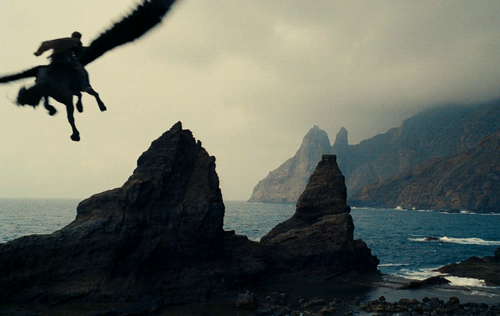
Other than the fact that this is based on Greek mythology (previously well-established as one of my favorite subjects), this movie is, in a way, responsible for my existence. And that is because, according to legend, this is the film that my parents went to on their first date. And apparently, it went very well, because I came into being 10 years afterwards. So, yeah, this film is personal, like Dirty Dancing.
And also like Dirty Dancing, I HAVEN’T SEEN IT? I don’t know HOW I escaped seeing this movie. And that’s especially considering that I’ve seen the new one. And that movie was...not great.
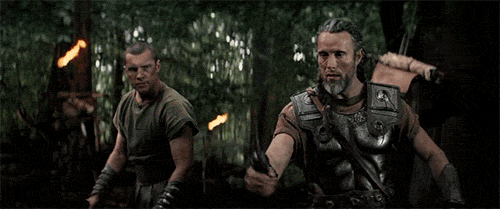
Maybe not the worst film I’ve ever seen, but it’s definitely not a good movie. But OK, what’s this one about, exactly? Y’all ready for “The 365 Greek Mythology Hour” again? OK, then, here we go. SING IT LADIES
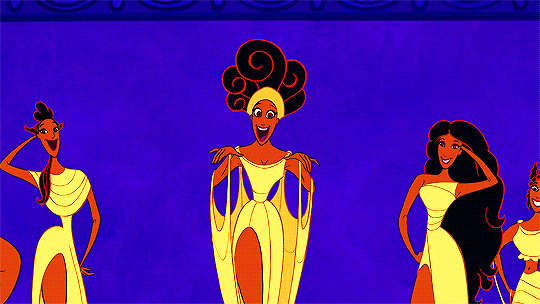
Clash of the Titans concerns the myth of Perseus, one of the greatest Greek heroes ever. Before Heracles, there was Perseus, son of Zeus. Yeah, Zeus, as he is wont to do, came down to Earth and had some good time with the princess of Argos, the beautiful Danaë. He came upon her while she was locked in a box by her dad, Acrisus, king of Argos.
Yeah, the Oracle at Delphi, ever the wisest, was visited by Acrisus one day, who wanted a son instead of a daughter. The Oracle spoke with Apollo (AKA huffed some of that SWEET SWEET ETHYLENE GAS), and told him that his daughter’s son would kill him. And so, he did the most logical thing: he locked her in a box. Yup. Dick. SPEAKING of dick, Zeus appeared to her in the open box as a golden shower. NOT THAT KIND OF GOLDEN SHOWER. I mean a literal shower of gold. Although...I wouldn’t put it past Zeus, of all gods. Dude was kinky.

So, Perseus is conceived, and Acrisus responds to this with his usual tact; he stuffs Danaë into a SMALLER box, and shoves it out to sea. She gives birth to a boy in the box, and the two eventually wash up on the shore of an island, where a fisherman finds them and takes them in. The boy is named Perseus.
Years go by, and Perseus’ mom is sought by his adoptive dad’s brother, and the king of the island, Polydectes. Polydectes is kind of a dick, and Perseus, now an adult man, doesn’t like him. The feeling’s mutual, and Polydectes has a plan. He holds a banquet, and forces all invited to bring a gift of horses. Perseus, being pretty poor, cannot bring this gift, but promises on his honor to bring whatever Polydectes wants of him, no matter what. And Polydectes asks for the head of Medusa.
Fuck.
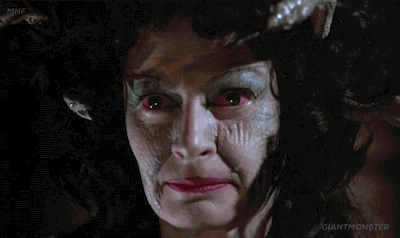
Medusa’s one of your classic Greek monsters, a Gorgon. She’s one of Athena’s victims, formerly a vain temple priestess who was, well...raped by Poseidon, let’s be honest. However, since Athena’s priestesses were meant to be celibate, she was the one who ended up being punished. Fuckin’ YIKES. But OK, literal ancient gender politics aside, Athena cursed her with snakes for hair, and the ability to turn her victims into stone with a gaze into her eyes. Classic. And sure death for anyone who went after her.
So, Perseus is fucked. He’s gotta kill Medusa, and he doesn’t even have a way to get to her place. And that’s when he gets a favor from none other than Athena, goddess of wisdom and wartime strategy, as well as Perseus’ half-sister. I love Athena (other than the Medusa bullshit, obviously), and this is one of her most prominent roles in mythology. Well, that and the creation of spiders. That was also punishing a woman for her vanity, by the way. She has a type.
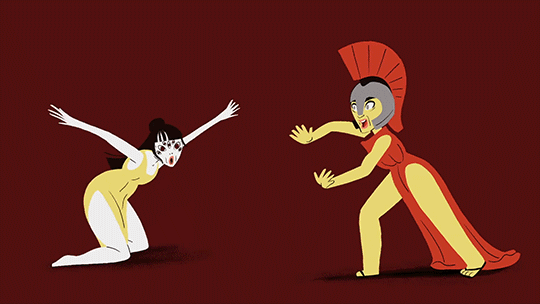
First, Perseus was told to find the Hesperides, nymphs of the dusk and dawn who would give him weapons. He got their location from the Greae, more colloquially known as the Gray Sisters. Weirdly enough, you may know them from Hercules, where they were combined with the Fates. They don’t have the future gimmick, but they do have that whole “sharing an eye” thing. Also, they share a tooth. Neat.
Anyway, Perseus takes their eye hostage, which makes them tell him where the Hesperides are. He goes to them, and they give him a bag to hold Meduga’s head. Then, the gods step in. Zeus decides to be a good dad for a change, and gives him an indestructible sword, and Hades’ Helmet of Invisibility. Hermes, another of Perseus’ half-brothers, gives him a pair of winged sandals to fly with. And Athena, technically Perseus’ patron, gives him a mirrored shield.
Perseus heads to the cave of Medusa, uses the shield, then goes up to her and cuts off her head. From her neck, for some goddamn reason, and golden sword pops out, alongside this guy.
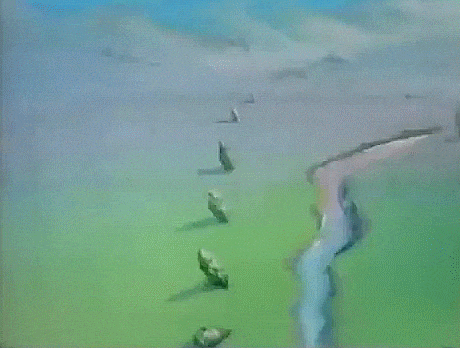
Yeah, he’s not made out of clouds. He’s actually the, uh...he’s the result of Poseidon’s crime against Medusa. Fucked up, innit? Pegasus flies up to hang out with Bellerophon to kill the Chimera, and Perseus heads back to...actually, he goes to ANOTHER king who was a dick to him, and turns him into stone with Medusa’s head. Kings hate Perseus, seriously.
Perseus heads home after that, and goes through Ethiopia. There, he meets the King and Queen, Cepheus and Cassiopeia. Cassie’s gorgeous, but she tells Perseus that her daughter Andromeda is, like, WAY hotter, as beautiful as the sea goddesses. Which PISSES OFF POSEIDON (who is basically the villain of Perseus’ story, let’s be honest), and he send a sea monster named Cetus to destroy the kingdom, UNLESS they sacrifice Andromeda to it. And, because kings are assholes in this story, they do, chaining Andromeda to a rock. But, because Perseus believes that all women are queens, he goes to rescue her, and kills Cetus using all of his things. He weds Andromeda, and turns his romantic rival Phineus into stone using Medusa’s head.
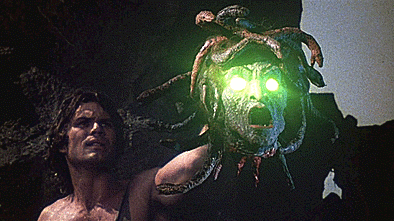
Usually, that’s where retellings end, because there’s a recurring trend to Perseus’ story after that. A king is an asshole, Perseus whips out the head, asshole becomes statue of an asshole. However, there is that prophecy to contend with, about Perseus killing his grandfather. See, Acrisus basically retired by this point, and lived in the kingdom of Thessaly. But one day, he went to see some games, in which Perseus was competing in the discus. Well, wouldn’t you know it, Perseus isn’t great at it, and loses control of the discus, which hits Acrisus, killing him instantly.
Utimate frisbee, man. It’s dangerous.
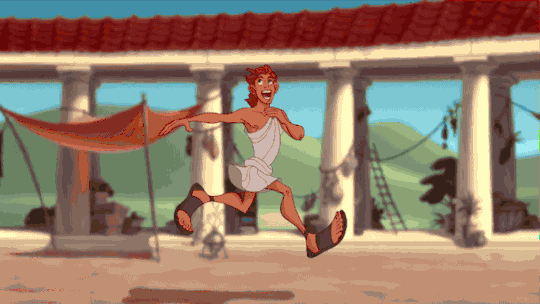
There’s another version where Perseus uses Medusa’s head to turn his dad into stone, surprise surfuckingprise there. But yeah, after that the story varies. Sometimes he becomes a king, sometimes he doesn’t. He basically always marries Andromeda and has kids with her. Sometimes he founds a city of his own, sometime he doesn’t. And in one ending, where he’s lived to be an old king, he fulfills his ultimate destiny and turns Medusa’s head on himself. Geez.
So, yeah, there you go. That’s the story of Perseus. Let’s, uh...let’s see what the movie does, huh? This is another Ray Harryhausen joint, so I’m...tentatively excited for it. We’ll see how badly they mess up the myth, and whether or not it works despite that. So, ENOUGH of me lecturing you guys, huh?
SPOILERS AHEAD!!!
Recap (1/2)
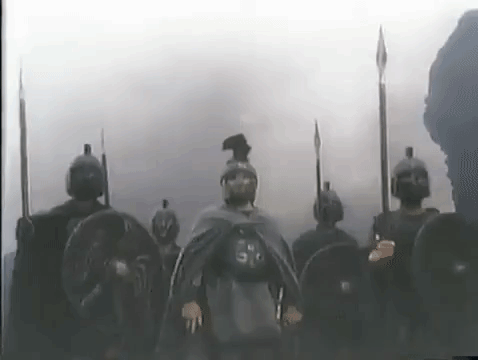
We begin approximately where most iterations do: King Acrisius (Donald Houston) has just cast his daughter Danae (Vida Taylor) and grandson Perseus into the ocean, containing them within a wooden chest in order to “forgive his daughter’s crimes”. Yeah, sure, OK, buddy. Whatever helps you sleep at night.
This also pisses off Zeus (Laurence Mother Fucking Olivier), who consorts with the rest of the Olympians on what to do to Acrisus. Said Olympians include Hera (Claire Bloom), goddess of marriage and women; Thetis (Maggie Mother Fucking Smith), goddess of the sea and leader of the Nereids; Athena (Susan Fleetwood), goddess of wisdom and strategic victory; Aphrodite (Ursula Andress), goddess of love; and Poseidon (Jack Gwillim), god of the sea.

Hera tries to defend Acrisus, noting his prior years of devotion to Zeus and the other gods. But Zeus ain’t HAVING that shit, and tells Poseidon to destroy the city of Argos in revenge. This is to be done by...releasing the last of the Titans? Which is apparently the Kraken. I mean...no, a thousand times no, but whatever.
This little tantrum is Zeus’ way of showing his love towards Danae, whose child Perseus is his. This is helpfully pointed out by Thetis, who seems...a little spiteful, as much as Hera is about Perseus. Seems like she’s stoking some fires. Hmm. She is Queen of the Nerieds, so she may play a larger role later on.
Beneath the sea, Poseidon readies himself to set loose the Kraken and destroy Argos, at Zeus’ command. Zeus, meanwhile, kills Acrisus by using a clay voodoo doll of sorts to strike him down. And that’s when Poseidon lets loose the Kraken for the first time. And the Kraken...
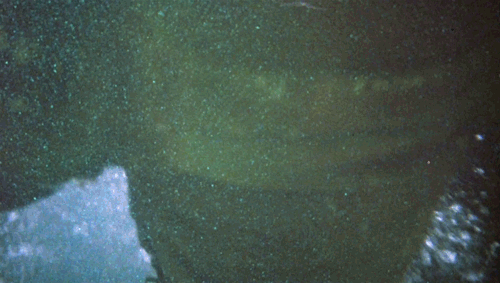
Guys, the Kraken looks...actually, I’ll spoil his appearance later on. The Kraken destroys the city, and Zeus kills Acrisius. So much for the goddamn prophecy that explains why Acrisius did what he did, but fuck me, I guess. Danae and Perseus, meanwhile, have safely arrived on the shores of the island of Seriphus, at Zeus’ insistence. There, Perseus grows from child into a fine young man, with Zeus always watching over him...and with Thetis and company always watching over Zeus. Interesting.
The adult Perseus (Harry Hamlin) lives happily on the island, much to Perseus’ delight. Thetis, on the other hand, asks about her mortal son, a young man named Calibos (Neil McCarthy). Apparently, Calibos is a bit of a monster, and while he’d been set to wed the princess Andromeda, he’s also managed to kil all living things on the island that he’s been given, save for a single winged horse named Pegasus. Hence...he is to be punished.
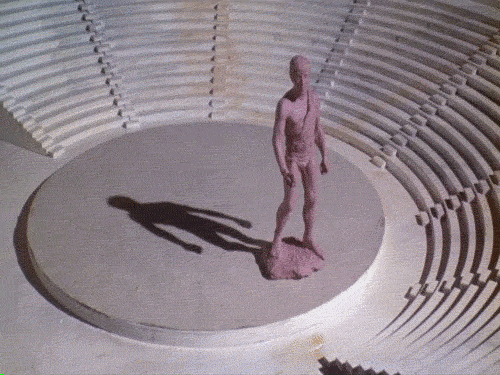
Calibos, by the way? Entirely original creation of the film, and there’s nobody like him in Greek mythology. Anyway, Thetis is crushed by this, and decides to exact revenge of both Perseus and her son’s would-be fiancee, Andromeda. She pledges to open up Perseus’ eyes to grim reality, and does so by placing him in the kingdom of Joppa, where Calibos was originally set to rule alongside Andromeda.
Here, in an amphitheatre, he encounters a mysterious masked and robed figure, who quickly reveals themselves to be Ammon (Burgess Meredith), a poet and playwright. Apparently, Ammon wears his disguise to scare off trespassers. He tells Perseus that all of Joppa is in a tizzy about a curse of some kind, and that the story of the fallen kingdom of Argos is a famous legend.
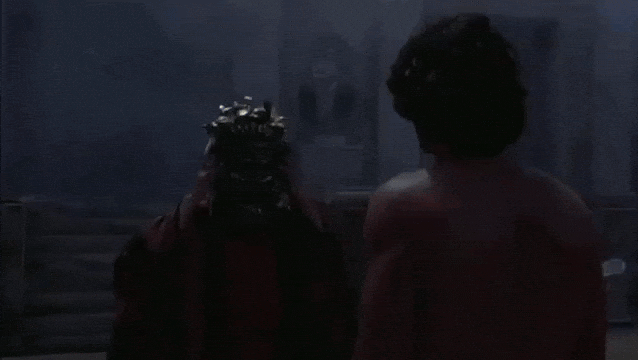
Ammon tells Perseus to go back home to Seriphus, but Perseus tells Ammon that he’s promised to restore his mother’s old kingdom, and decides that Joppa would be a good start. Despite his drive, though, Zeus is pissed off at Thetis for plopping Perseus down unprepared. He tells the other goddesses to give him gifts to help him claim the kingdom of Joppa as his own. This includes a helmet from Athena, a sword from Aphrodite, and a shield from Hera. I mean...OK, that’s super goddamn weird, but OK.
After Zeus leaves, the goddesses rightfully complain about Zeus’ constant womanizing, but note that he probably doesn’t remember Danae at this point, is is most likely acting out of stubborn pride for his “handsome son”. Their words, not mine.
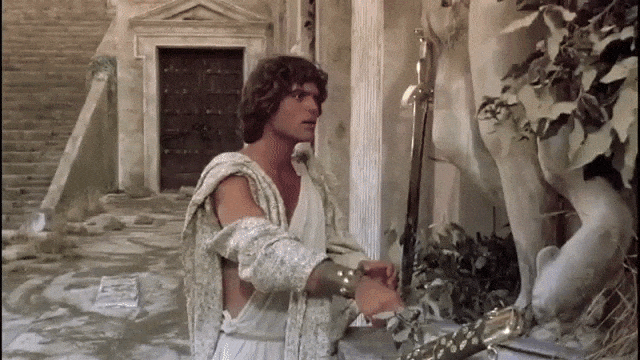
In Joppa, Perseus finds the gifts by the statues of their grantors. The sword from Aphrodite is adamantine, like the original myth, and slices through marble without a blemish. The shield from Hera...talks. Yeah. The shield bears the visage of Zeus, who tells him that the weapons are gifts from the gods, and that the helmet from Athena turns the wearer invisible. I mean, fuck Hades, I guess, but OK. Technically Athena did give the helmet to Perseus, so OK.
Armed with his new gear, an invisible Perseus immediately takes off to see Joppa, sans his sword. We only see his footsteps in the sand as he leaves, which is legitimately a VERY neat effect, and I’m not sure how they did it, but it’s neat as hell. Off to Joppa, a vaguely Phoenician/Persian kingdom, despite the fact that the original Joppa, or Jaffa, is a port city in Israel.
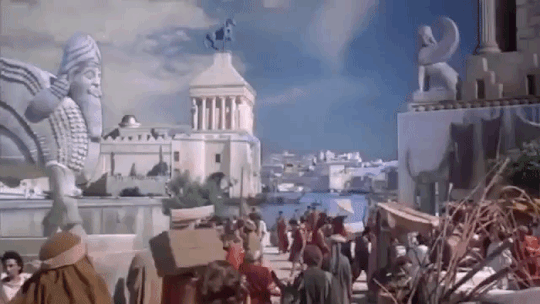
There, he meets a soldier, Thallo (Tim Pigott-Smith), who tells him of the situation. Since Calibos fell to Zeus’ wrath, Andromeda rejected him, allowing any suitor to try for her hand, whether they be royal or not. To do so, they must answer a riddle. If they fail to answer, the would-be suitor is burned to death. This is lorded over by Queen Cassiopeia (Sian Phillips), while Andromeda (Judi Bowker) lives in the tower of the palace.
Which is why Perseus IMEDIATELY uses the helmet to go into her room that night! CLASSY, PERSEUS. There, he sees...a giant vulture bring a cage to Andromeda’s balcony. No idea where in the fuck this is going, but that’s a damn good looking vulture. God, I love Harryhausen.

Anyway, the vulture is here for Andromeda’s soul, which leaves her body and goes to sit in the cage. The vulture takes off with it, al as the invisible Perseus watches on. He takes this opportunity to touch Andromeda’s face in her sleep (stop, Perseus, for the love of Zeus), then decides that winning Andromeda is his destiny. And so, his simpin’ journey begins.
The next day, Perseus asks Ammon how they can follow the vulture, who has apparently headed to the marshes to the “marsh lord”. To follow the vulture, Ammon suggests that they find and capture the last of the winged horses, known as Pegasus. And we’ve officially lost the track of Greek mythology at this point. Shit.
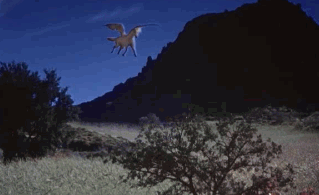
Well, with Ammon’s help, Perseus captures Pegasus and rides him through the skies. Meanwhile, in Corinth, some dude named Bellerophon is just having a stroke, I guess, because he’s totally fucked now. Whatever. The next day, the vulture comes back to Andromeda’s place and takes her soul to the marsh. But this time, Perseus and Pegasus follow them.
In the marsh, the marsh-lord and riddle-maker is revealed as Calibos, who is still in love with the beautiful Andromeda. As she cannot love him, he provides to her another riddle to give her would-be suitors. In tears, she memorizes the riddle and its answer, Calibos touches her uncomfortably, even as Andromeda asks him to lift his curse and show pity. But he refuses, in pain from his love. Jesus, this movie should be called Clash of the Simps, goddamn.
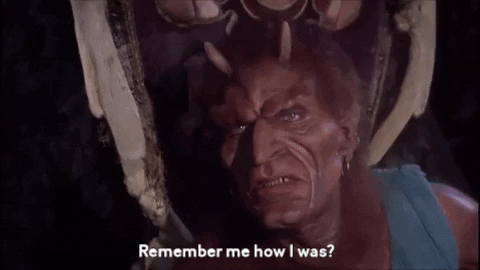
Perseus was watching the whole thing, though, which Calibos immediately figures out when he sees Perseus’ footsteps in the dirt. As Perseus goes through the swamp looking for Pegasus, he’s found and attacked by Calibos. Calibos, by the way, is a guy in pretty solid makeup in close-up shots, and a Harryhausen model in far-away shots.
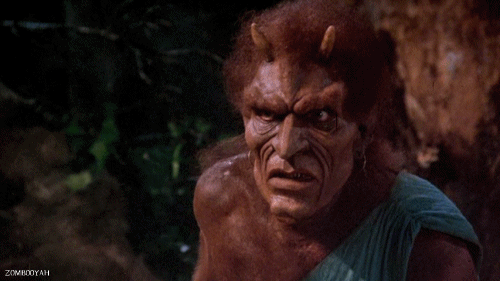
The two struggle, the helmet is lost in the swamp, and Perseus draws his sword. But we suddenly cut away to see the daily ritual of the presentation for Andromeda’s would-be suitors. Perseus steps in, having survived the attack from last night, and offers his hand to Andromeda, who recognizes Perseus from a dream. She gives the riddle, which is ABSOLUTE BULLSHIT. Here, I’ll prove it.
In my mind’s eye, I see three circles joined in priceless harmony. Two, full as the moon; one, hollow as a crown. Two from the sea, five fathoms down. One from the Earth, deep under the ground. What is it?
Any guesses? Anybody?

NO MATTER WHAT YOU FAIL. Because the answer is Calibos’ ring! HOW IN THE SHIT WOULD ANYBODY HAVE GUESSED THAT? It’s a golden ring with two pearls on it! WHO KNOWS THAT SHIT? I call complete bullshit, and the only reason that Perseus knows it is because he spied on this last night! Also, because he cut off Calibos’ hand, and made him renounce his curse, which is...never really specified, now that I think about it.
With that, Perseus has both Andromeda’s and Calibos’ hands! HA! Calibos is not as amused, as he preys to his other Thetis, at a temple of hers. He demands that Thetis take revenge on those whom Perseus loves, specifically Andromeda and the city of Joppa itself. He demands justice, but Thetis identifies this correctly as revenge. All the while, Perseus declares his love for Andromeda, and they seal their union with a kiss and ritual.
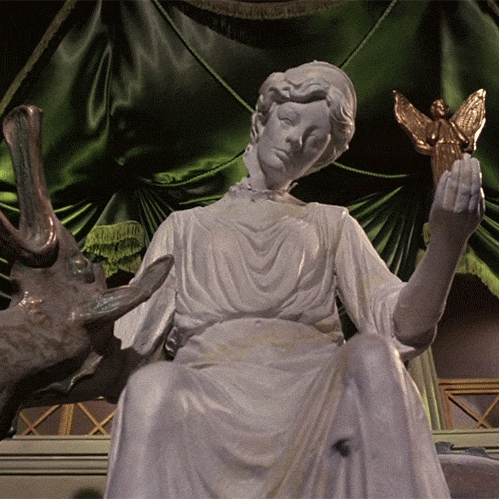
During this ritual, in which Andromeda and Perseus are essentially married, Queen Cassiopeia, LIKE A DUMBASS, says that Andromeda is more beautiful than the goddess Thetis herself. Yeah. BAD FUCKING MOVE, especially because she said that IN FRONT OF THETIS’ FUCKING SANCTUARY. At least that dumbass move was kept from the original story.
Well, Thetis tells Cassie that she can only atone for her stupidity in one way: sacrifice your daughter to the Kraken in 30 days. Later on, Perseus speaks with Ammon to figure out how they can defeat the Kraken. Ammon suggests speaking with the “Stygian Witches”, who I’m assuming are our Grey Sisters for the night. However, according to Thallo, they have a taste for human flesh. Still, Perseus is going, as are Ammon, Thallo, and Andromeda. But not Pegasus.
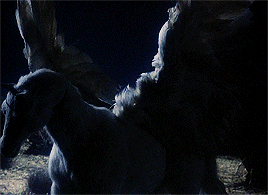
Well...shit, man. That changes a few things, huh? But that’ll be addressed...IN PART TWO! See you there!
#clash of the titans#clash of the titans 1981#desmond davis#greek mythology#perseus#harry hamlin#andromeda#judi bowker#burgess meredith#maggie smith#laurence olivier#ray harryhausen#fantasy march#user365#365 movie challenge#365 movies 365 days#365 Days 365 Movies#365 movies a year#mygifs#my gifs#merlinsprat
14 notes
·
View notes
Text
Hera - A wrathful goddess?
What’s the first thing that comes to your mind when you think of Hera? Chances are, it is her relentless pursuit of Zeus’s mistresses and their children. That’s how many people seem to picture her: As an angry and bitter wife who has nothing better to do than to take her wrath out on others.
I say that she doesn’t deserve that treatment. Instead I want to argue that she is much less vengeful than people think. Let’s first look at some of the myths involving Hera and Zeus’s mistresses and children:
Io: Zeus turned Io into a cow to hide her from Hera. But Hera tricked Zeus into giving her as a present. She was later brought back by Hermes but Hera punished Io by having a gadfly pursue her till she broke down from exhaustion.
Leto: Hera banned Leto from giving birth to Apollo and Artemis on any land under the sun.
Semele: When Semele was pregnant with Dionysos, Hera visited her in disguise and convinced her to ask Zeus to reveal his true form to her. Zeus, who had previously sworn to grant all of her wishes, did as she asked and Semele, upon looking at him, was turned into ashes.
Heracles: Hera famously hated Heracles (better known as Hercules) and tried to hurt him at every chance she got, going so far as to strike him with madness which caused him to murder his own wife and children.
These are not all myths of course, only the most famous ones. Let’s go through them one by one:
Io: Io’s punishment was severe but one must remember that she was also a priestess of Hera. Being betrayed by your own priestess is a very severe insult.
Leto: Leto’s children were destined to become greater and more powerful than her own so that’s why she pursued her.
Semele: Semele knew that she was pregnant by Zeus and maybe even prideful because he had promised her to fulfill her every wish. Hera turned that arrogance against her.
Heracles: Zeus loved Heracles more than the children he had with Hera. Still, Heracles’s mother Alcmene was never punished by her. And even though Hera hated Heracles, she made peace with him after his death and even gave him her daughter Hebe as a wife.
Hera always had a specific reason for punishing them. And there are many other mistresses and children of Zeus she didn’t seem to care about at all. Among them are Europa and her sons, Danaë and her son Perseus, Antiope and her sons, Maia and her son Hermes, Dione and her daughter Aphrodite, Leda, her sons and her daughter Helen and Laodamia and her son Sarpedon. That doesn’t sound like a particularly vengeful goddess to me.
The ancient Greeks certainly didn’t see her that way. In ancient times, Hera was the patron goddess of Samos and Argos. Two of her temples at Paestum (in modern day Italy) still stand to this day.
Mind you, I am not saying that my interpretation is the correct one and that all the others are false! If you don’t like Hera and/or you disagree with me, that’s completely fine. She still does a lot of things in the myths that modern day readers might find very objectionable and rightfully so. But so do the other gods. And that’s my point: Yes, she can be scary and vengeful sometimes but she definitely doesn’t deserve to be reduced to “the jealous wife”.
475 notes
·
View notes
Text
Tuesday, July 25th 2017
I expected this day to pretty much be defined by the midterm exam that I took in the morning. I was wrong.
Of the three hour morning class, the midterm took up an hour and a half, during which we completed the identification described in the previous post, and also wrote an essay. The ID that I completed was on Klimt’s Danaë, which I was very happy to do because Danaë is an ancient Greek mythological princess, and a figure that I am very familiar with.
Her story begins like many do in classical mythology, with a prophecy concerning her future son. Supposedly, he was destined to kill his grandfather, her father. So, naturally, her father locked her in a cell underground with no openings except a grate at the top to let in air. As one does.
Of course, prophecies will out, no matter how much people try to avoid them, and so no one should be surprised that she ended up impregnated by a shower of golden light that fell from her grate. That golden light was Zeus, because for better or for worse every story in Greek mythology can be traced back to Zeus being unable to keep it in his pants.
(Her son, by the way, is Perseus, who will grow up to slay Medusa and rescue the princess Andromeda from a sea monster and, yes, be tangentially responsible for his estranged grandfather’s death by throwing a discus that goes off course and kills an old man in the crowd.)
The painting by Klimt is of Danaë and the golden light, and the frame of the painting is supposedly the cell that she is being kept in. There is a lot of symbolism there. I wrote a page and a half.
I should take a moment to say that, while my handwriting is typically both atrocious as well as massive and sprawling, and so usually a page and a half is about two paragraphs. In exams, though, I need to write legibly, and the best way I’ve found to do that is by writing very small. Saves paper, too.
At this moment you might be asking yourself something along the lines of, but Trixie, if you can write legibly, why don’t you just write legibly all the time? And the answer to that is that it’s actually really pretty painful to do? I power through the pain for in class essays, because I don’t really have a choice, but it involves holding the pen a completely different way, and often ends in hand cramps. My hand didn’t fully recover from this particular exam for about two days after.
The second half of the exam, after the identification, was an essay, during which I reflected on the role that illness played in Shadowlands and End of the Affair. My essay ended up being about four pages, but it can all basically be boiled down to: Shadowlands treats the illness and eventual death of Joy Gresham as something meaningful and serious, but also transformative, giving the characters a chance to grow and change into better people for the hardships that they suffered. End of the Affair uses illness as a way to take out the only female character as quickly as possible, so that Maurice Bendrix can angst about her death and their affair without her living. They might as well have shot her in the head for all the good the illness did. They didn’t even mention what it was. She just coughed occasionally, and then at some point her husband showed up to interrupt an afternoon out with her lover, and was like SHE HAS A MONTH TO LIVE. What an awful movie.
All in all, though, I will tentatively say that I think I did a decent job. I’m not going to say more than that, though, because we haven’t gotten our exams back yet and I don’t want to jinx anything.
The midterm wasn’t the most interesting thing that happened that day, though.
So, we all get back to the house, we’re tired, we’ve spent the last couple days furiously studying and watching terrible movies, we figure we should have a nice, quiet evening, so we decide to take a picnic to the park.
It’s been good weather for a while, so the grass isn’t that damp, and one of us offers her comforter to use as a picnic blanket, which we all appreciate. We settle down near the pond, it’s about an hour until sunset so there are plenty of families still out having fun, but all in all it’s an incredibly peaceful setting.
Then a very, very drunk man wanders up and demands a chip.
We refuse. They’re our chips.
He lays down next to us, and demands a chip.
We refuse, and ask him to leave us alone, please.
He starts alternating between cursing us out, asking for a chip, and raving about us being American.
“Welcome to fucking England,” and “I don’t want your money, I don’t want your food, I just want your accents,” were some particularly stand-out lines.
It was fairly terrifying, honestly, and I am very grateful for my friends, because my general fear response is to laugh, and that is not the deescalation that the situation needed, so thank goodness other people were there to tell him politely to leave us alone.
He eventually left, though not before throwing an empty beer can in our general direction. It glanced off of the shoulders of the two people sitting next to me, and it was at that point that we all really got around to looking for park security.
We couldn’t find them, so eventually, just to be safe, we moved our blanket to the opposite side of the pond. The peaceful atmosphere had been distinctly shattered, though.
The evening of odd occurrences didn’t entirely end there, though. Later, as we arrived back to the house, we found a young woman crying on our porch. I offered her tissues, one of my friends offered her a glass of water with an implied do-you-want-to-come-in-off-of-our-rather-uncomfortable-porch-steps, but she refused both and continued to cry on our porch. We didn’t know what to do, and it had been a very long, rather trying day, so we went inside.
#london#travels#movie review#people are super weird sometimes#she was gone next time we checked though#I think she was waiting for her friends or something?#I still don't know why she was crying#it was a weird day
1 note
·
View note
Note
Long post so not sure wheter or not you will read it, but there's a retelling of the myth of Perseus for kids by Imme Dros: De huiveringwekkende mythe van Perseu. The book is in german, so I will point put some bits from it that I liked and some rough translations of the fragments by me.
1) Here it's said that Acrisius thought Perseus is the son of his twin brother, not of Zeus. This is the first time for me when I see a book aimed for kids about Perseus that mentions Proteus too. Also, it is mentioned that Acrisius imprisoned Danaë back when she was only 13.
"King Akrisios heard him crying under his feet. Furious, he had Danaë taken from her prison.
'Who is that child? Whose child is that and who is the father?'
'This is Perseus, I am his mother and Zeus is his father.'
'Zeus the father? You must mean my twin brother. Of course he seduced you. To take my land! He is not satisfied with his own area, he wants everything. He has sons and now he is also claiming my grandson.'
(King Akrisios and his brother were born fighting, already fought in their mother's womb, already hated each other before they saw the light and they didn't trust each other for a fathom.)"
2) Danaë wants to educate child Perseus, but all he thinks about is fishing. She wants him to know about the gods, to which Perseus tells her that the only god he has to know about is Poseidon. Danaë then tells him that he will be the King of Argos one day so he must know about the gods too. Little Perseus's favorite god is Hermes, so he constantly asks his mom to tell him more about him:
"Diktys taught young Perseus all about ships, sails and oars and everything he needed to know about water, wind and current to become a decent fisherman. Danaë wanted to teach him everything about the gods. Perseus had no patience for that. He protested:
'I go to sea and I only need to know Poseidon, that is the god of the sea, that is the god of fishermen.'
'But you will not remain a fisherman, Perseus. You will be a king! King of Argos. Kings should know the gods.'
'Well, then tell me the adventures of Hermes. Hermes is also a god and he always wins, that's exciting,' Perseus demanded, but his mother kept trying.
'Soon from Hermes. Listen now, Perseus. First there was Chaos. Everything came from Chaos... Say, are you listening, Perseus?'
'Yes, I hear it. But now from Hermes. Now from Hermes again.'
'Soon from Hermes. This is important. You need to know this. Everything comes from the great, fierce, dark Chaos...'
3) When Polydectes saw Danaë for the first time he thought she's Artemis and started to worship her for a moment:
"A powerful king ruled on the island of Serifos who oppressed and sucked his people, Polydectes. He was Diktys' brother and just as bad as he was good. About the time Perseus became a man came Polydectes meets the lovely Danaë during a hunt through the forest. At first he thought she was Artemis, the goddess of hunters, and he fell down before her. When he noticed she was human, he demanded that she become his lawful wife. Danaë didn't want to."
4) At the beginning of his journey Perseus arrives for the first time in Athens, where he starts crying because of how beautiful the city was:
"Who stood shouting loudly in the middle of Athens could just reach a man near the walls with his voice. So the city was not allowed to get any bigger, that would be a danger. Perseus cried his eyes out. What a square, what houses, what a beautiful temple, what a mighty theater. That such a thing could exist. And oh, what people. He would get an answer to his question here, that was certain. But in the busy market of Athens no one could help him.
'Did you say Gorgons?'
'Gorgons? No, I wouldn't know.'
'No, you shouldn't be with us.'
'Go ask that in Delfi. Everyone goes there and that's why it must be good. Anyone who has a question and wants an answer always goes to Delfi.'
'Delfi, go to Delfi.'
5) They go by the version where Medusa was a beautiful mortal woman once. The difference is that here she willingly has sex with Poseidon in Athena's temple, and when she asks her how dare she do such thing Medusa tells her that Poseidon loves her and wants to marry her and she will soon become her aunt, so she should be nice with her from now on. This is the moments when Athena gets angry and turns her into a gorgon.
"[Medusa] made no apologies and bragged about her affair.
'If Poseidon marries me then I will be your aunt, Athena. He has more power than you, so don't worry about that temple.'
Pride comes before a fall, let people realize this very well! No matter how one excels, modesty is always required. They will never become gods, they just don't want to understand that. [...] A single bad trait can undo all the good that a mortal received. Gods hate pride and it was for her pride that Medusa had to pay, even though she was a nymph and the daughter of Forkys, the sea god."
6) We get to see the moments where Athena teaches Perseus how to fight while looking and his shield, whereas Hermes teaches him how to fly with those sandals:
"With the shield in her hands, Athena came to Perseus and she said to him, the goddess with the sea-green eyes:
'Never look directly at a Gorgon, look into this shield and look for her image, just remember that the right is the left in it.'
Perseus practiced diligently for the battle with Medusa, aimed in the shining shield at trees and rocks. Hard enough, it took him days to hit anything. He also had to learn to fly. With trial and error. Hermes held his hand and it took a while before he managed to keep his balance during take off and descent, before it flew straight and could make a quick turn. Flying seemed so easy when you saw birds flying,
but Perseus would never become a swift or a seagull. When he became more confident in floating and not every nymph anymore was crooked with laughter as he sailed past, Hermes announced that it was time to leave. And the merry nymphs wept loudly at parting."
7) The Perseus and Andromeda moments are sweet but cute. Also, here Andromeda and her family live in Joppa:
"Now Joppa was in charge because Perseus demanded the bride, but the man with the oldest rights came with an army.
To make a long story short: Medusa's head
served well again because every enemy petrified. Perseus and Andromeda were married that same day. He loved her and she loved him so they were happy The celebration of the great wedding in Joppa lasted ten days."
"King Cepheus made the cupbearer go round again, then each guest left for his own house to sleep. But the king slept in the palace next to Kasiopeia, and Andromeda shared her bed with her bridegroom Perseus."
8) Perseus also traveled in the Underworld before arriving in Joppa. At his wedding he tells the quest about what he saw in the realm of Hades and even tells the myth of the seasons at one point for some reason (but I won't include it as well because it's too long):
"Nowhere is the water as deep as where the water is separates the living from the dead. Five rivers flow between us and the poor, unfortunate shadows. When I looked at the grave lily meadows it seemed as if I
just like the Gorgons looked into a mirrored shield, but outside that shield was none of what was reflected. I saw the
images of people, but the people themselves were nowhere. And I saw those shadows of people nowhere present stagger across the meadows and report to the entrance where the Dog sat. He let the shadows pass, but when one wanted to go out he shook his three heads. Whether they were old, whether they were young, inside was inside. There in the depths Haides and Persefoneia rule."
"On the edge of Tartaros, that is the deepest depth, houses the goddesses of revenge, who continue to persecute people if they have committed crimes. Their faces and claws, horrible to see, something I will never be able to forget. The Harpies are also monstrously ugly, fast as the storm wind they fly about to torment the dead, to provoke the people. They have heads like women, bodies and wings like birds, claws like tigers. When a man has insulted a god come the cruel Harpies. They pollute his food, shit on his plate and piss in his cup.
Until he dies of hunger at crowded, smelly tables. And I saw Sleep and his brother Death far away walking at the gates where all dreams come through."
"...daughters of my father Danaus, bear water to a great and bottomless barrel in leaking jars.These women killed their husbands the night after the wedding day. When I saw the poor shadows dragging the leaky jars my eyes became blind with tears, I couldn't bear it. And I became afraid of everything that could happen to myself. Suddenly I wanted to leave and I would prefer to forget everything what I saw there under the dark earth."
9) There's a short moment where, turning back to Argos, Danaë visits the chamber where she was imprisoned years ago:
"King Akrisios heard the news and his bad conscience drove him away from Argos to a city in the north. He had friends there in Larissa, he was safe there. So when Perseus arrived with his wife and his mother, he found in Argos an empty palace and no one could say where old king Akrisios had gone, whether he was alive or perhaps dead and under the earth. Danaë showed her son the underground dungeon,
dark and gloomy with bronze doors and no windows. And she visited the places where she had played as a girl. When they were on the beach of the sea just like a long time ago laid flowers of pebbles, she cried bitter tears. Because her life had turned out differently than she had hoped."
Why are all the interesting Perseus adaptations not available in English?
#greek mythology#ancient greek mythology#greek pantheon#perseus#andromeda#Athena#Medusa#Danae#Danaë#Acrisius
37 notes
·
View notes
Text
I absolutely DESPISE the way Shadow of Perseus treated Medusa. Because this is more of a historical fiction (😒) than a mythology retelling in its own right and all the mythological elements are completely erased here Medusa isn't a gorgon but an ordinary woman. Which makes the entire dynamic between her and Perseus completely different.
In the original myths she was a dangerous monster Perseus was sent to kill by a king that was convinced he won't make it up alive. Many people criticize the fact that Perseus received so many weapons from the gods, but when you remember how overpowered Medusa was in the original myths you finally start understand that he was confronting with the ancient equivalent of an atomic bomb. At this point I perfectly understand why the poets made her mortal, because that thing would've became Typhon 2.0. throughout time:
Lucan, Pharsalia Book 9:
"… but even Phorcys, second to Neptune her own father, in ruling the sea, feared Medusa, as did her mother, Ceto, and her sister Gorgons; she had power to threaten sea and sky with rare paralysis, and clothe the world with stone."
Furthermore, in this version her gaze turns the entire Seriphos to stone:
Strabo, Geography 10.5.10:
"Perseus was reared there [on Seriphos], it is said, and when he brought the Gorgo's head there, he showed it to the Seriphians and turned them all into stone. This he did to avenge his mother, because Polydektes the king, with their cooperation, intended to marry his mother against her will. The island is so rocky that the comedians say that it was made thus by the Gorgo."
Last but not least, her blood could've bring people back to life:
Apollodoros, Library 3.10.3:
"And having become a surgeon, and carried the art to a great pitch, he [Asklepios] not only prevented some from dying, but even raised up the dead; for he had received from Athena the blood that flowed from the veins of the Gorgon, and while he used the blood that flowed from the veins on the left side for the bane of mankind, he used the blood that flowed from the right side for salvation, and by that means he raised the dead."
But in this retelling not only that she was a mortal woman people spread gross stories and legends about, but also Perseus' first love, whom he later killed because she rejected him. The entire context, reason and meaning of the original myth was thrown off the window just so that the author could've made a "Man cannot take 'No.' for an answer." or "The worst he could do." feminist commentary out of Medusa’s murder when Danaë and Polydectes are right here. This is NOT your usual femicide, good people!
Not to mention the fact that here Perseus is keeping her decaying head in a bag like a trophy or prize in one of the most disgusting ways possible (even while raping Andromeda) and I'm afraid the author was only one step away from writing some necrophilia shit purely to make Perseus the most evil man out there. Medusa had no stone gaze in this book, so there was no practical or logical reason behind keeping it. What makes the situation even more sickening is that back in Ancient Greece people were appalled for not giving someone a grave or profanating a corpse (just like nowdays). Yet Perseus accepted to have that head buried only after Danaë convinced him. In the last chapter it is not him, but his mother and wife who bury that head, while he shows no shame or remorse for what he did. In Pausanias' account he buried her head in Argos, while in most versions he gave it to Athena. Even in the OG source material he still had ethical and moral issues regarding her head after he petrified Polydectes, but Claire Heywood didn't give a damn about ancient cultures and beliefs.
9 notes
·
View notes
Text
At this point I'm convinced the author doesn't know the definition of toxic masculinity and just labels anything traditionally or stereotypically associated with masculinity as toxic. Because otherwise I cannot comprehend how did her Perseus became a toxic man in her retelling.
Recently I've seen a post from the author's Instagram where she basically said this:

Okay, so you're going to tell me that the reason why Perseus turned out into a cruel person is because of the men around him, right? But how did these men influence him in a bad way exactly?
Let's start with this dialogue between Danaë and Dictys. Now, Dictys is supposed to be this caring father-figure for Perseus who raised him along with Danaë all this time, but here he doesn't seeem to be depicted in such a good light:
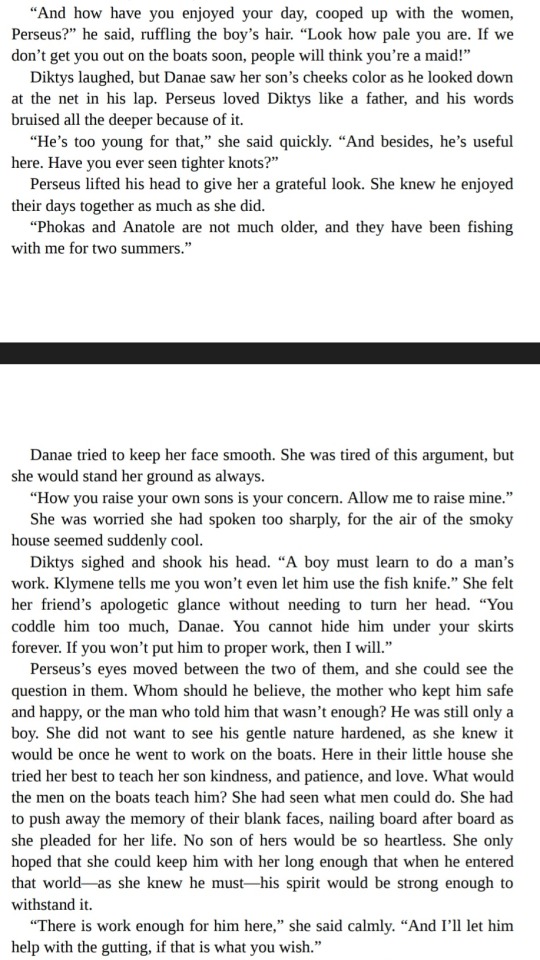
Here we have the "pale=woman" insult Perseus receives that makes him feel bad, along with the entire classification of chores as "this man/woman's work". But the most frustrating part is the way Danaë thinks about the other fishermen. "...she tried her best to teach her son kindness, and patience, and love. What would the men on the boats teach him?" I'm sorry, but... what?
First of all, the entire "kindness, and patience, and love" part is linked, in my personal opinion, in the way western people tend to perceive women as inherently nurturing and warm figures, when if anything there are cold and sometimes even ruthless parts of motherhood that contribute to the growth of the child into an independent and resourceful adult capable of taking care of themselves. There's no way an ancient greek woman would've thought that way. If anything, Danaë would've rather encouraged Perseus to work hard and learn how to provide for himself. (and basically survive, since we're talking here about a period of time where you weren't going to McDonald's for food...). Back then this wasn't just a "man's work" but a way people were ensuring their existence, ESPECIALLY if you were living on a small island and the only thing you were surrounded by was water.
Secondly, "What would the men on the boats teach him?" just rubs me in a wrong way. Woman, that's not a Mafia Gang! That's literally just a group of men catching fish in order to feed themselves and their families. The ultimate message I get from this is that men are inherently toxic figures that leave a negative impact on boys and shape them into toxic men as well. Positive masculinity? Healthy paternal figures? Individuals having different personalities and characters in general? Never heard of this! Also, Perseus is already twelve here. Are you gonna tell me that he's gonna forget everything his mother taught him the moment he steps outside and absorb whatever other people say or do? Also also, are you gonna tell me that a twelve years old boy never did any physical work outside thoughout his childhood in the goddamn Bronze Age?
Next we have the scene where Perseus has to sacrifice a goat after winning a wrestling competition:
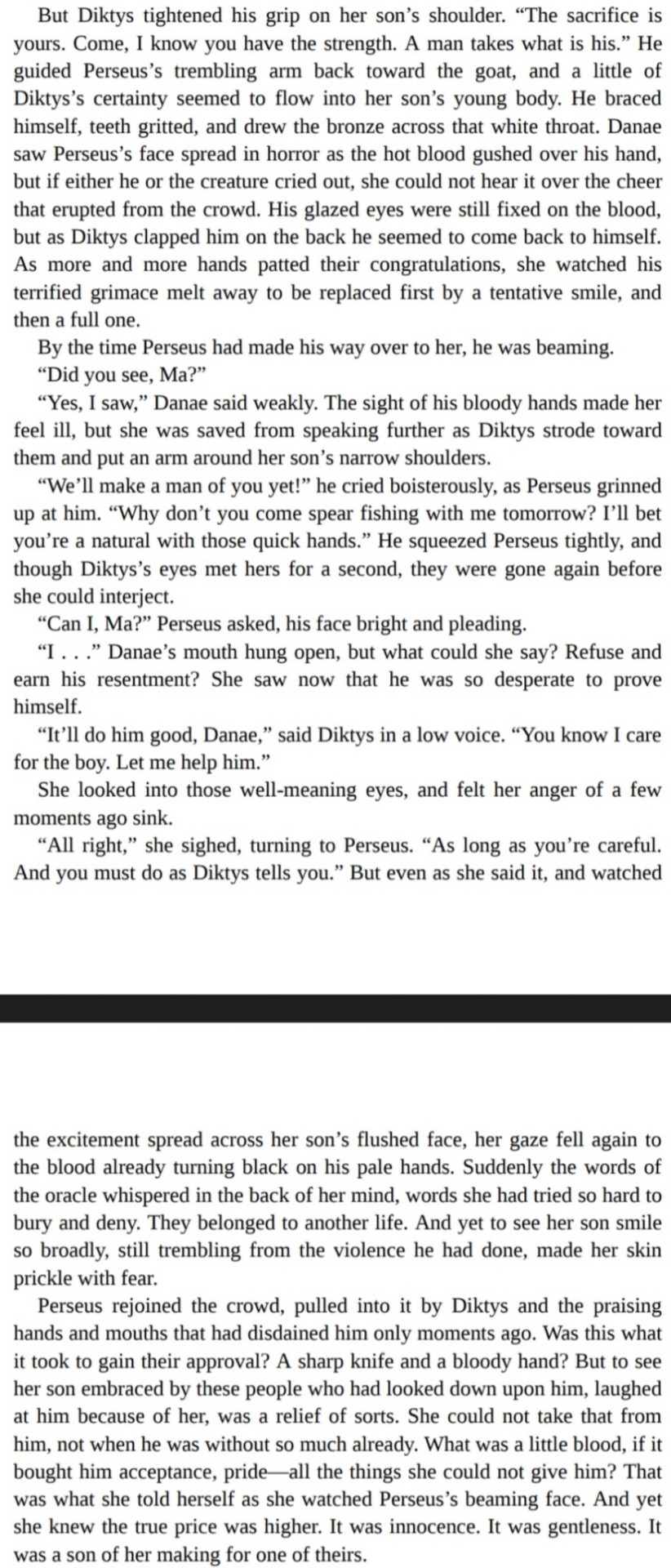
This scene particularly is deeply hilarious to me because it's more than clear that it was written by a westerner. Not only that back then killing animals was ridiculously common (I wonder where do these people believe that we get our meat from...), but it also reflects an extremely mistaken perception on the morality behind animal killing. Killing an animal for food isn't considered evil or cruel, but torturing one to death is. In this case Perseus basically cuts the throat of that goat, which is one of the most humane ways of taking its life because it's instant and causes less pain. "Was this what it took to gain their approval? A sharp knife and a bloody hand?" Again, the author has a very erroneus perception on how sacrifice works because it isn't the violence itself that it was praised, but the fact that he was contributing to the community by providing them with food and letting offerings to the gods. It's a cultural aspect of the ancient society that still exists in different places from the world and has nothing to do with toxic masculinity. Also, the entire association with the loss of innocence is ridiculous to me, especially since these are the thoughts of an ancient woman who was cutting fish one chapter ago.
The most relevant example in this entire retelling that could be considered a case of "toxic masculinity" is the way that ship crew infantilized Perseus and made him develop a fragile masculinity to the point where he desperately wanted to prove himself of being a real man by sleeping with women paid by the captain, murdering Medusa and then claiming he killed a dangerous monster and kidnapping and raping Andromeda, pretending that he rescued a princess all this time. And even then there were still sailors who considered that what he did was immoral, such as that egyptian guy:

Furthermore, the fact that this novel was written from the POVs of three different women who barely had any contact with that crew doesn't allow us to actually see how did they influenced him negatively and changed him all this time. So far what I'm getting from this is that your Perseus is a sponge-brained person uncapable of thinking for himself and make the difference between good and bad, and forgets all of his mother's advices and lessons the moment he leaves his home just so that he could receive other people's approval. If you actually wanted an example of toxic masculinity that can be also found in the original myths as well then you could've had Perseus petrifying both Polydectes and his men for supporting him in marrying his mother against her will. But I quess this idea wouldn't have been on this author's taste, because that would've ment acknowledging that Perseus was NOT, in fact, the epitome of toxic masculinity.
Toxic Masculinity literally means justifying men's destructive and harmful behaviors such as rape, domestic violence, sexism and misogyny in general, homophobia etc., thus perpetuating the exact same attitudes that have a negative impact among people and society. What makes the OG Perseus an example of positive masculinity is that he uses his strenght and power in order to protect his mother and wife and ultimately avenge them. Which is much more strangely progressive and ahead of its times than people would give credit to, especially because we're talking here about a historical time when either a king choosing to marry a woman against her will or a powerful and influencial man marrying his niece with his brother's approval wouldn't have been criticized nor raise any ethical problems.
I also despise this constant emphasize on men's toxicity in this retelling, to the point where they're treated like an uniform category of people with the exact same essence. It's linked in this idea that men are inherently violent and misogynistic and that they were "born evil", when it truth they were socialized to think and act this way. It's just the extreme opposite of the idea that women are inferior by nature, which only continues this gender war and brings no contribution to the destruction of this entire oppressive system. Because quess what: Patriarchy is not one bad person or one group of bad people, but an entire system, and gender essensialism doesn't oppose but benefits it.
Not only that you turned Danaë into an incompetent mother, but the ultimate conclusion you're insinuating here is that no matter what she would've done Perseus would've still became evil anyway simply because he's a man.
10 notes
·
View notes
Note
Perseus question
Why did Hera not attack him or his mother? It could be the fact that Danaë never been married or that a Zeus had turned himself into a golden shower.
I have no idea. Maybe he's just lucky, idk
I actually talked about this a while ago (copy paste):
Ok I think I’ve figured out why Hera doesn’t hate Perseus (mostly HC) so picture this: Hera is pissed off that Acrisius imprisoned Danae as if it wasn’t inevitable that his descendants will take his throne since he won’t rule forever, not to mention that if Acrisius died without an heir it would cause a power vacuum that might expand into a civil war that would destroy her beloved city and she really favored his father Abas (which is actually canon look it up) and would rather that the royal family of Argos be descended from him. Zeus realized this and being a prick he impregnated Danae and informed Hera that he did it for her and that even though he has a cheating bastard he still loves her the most, obviously it angered Hera but she decided to spare Danae and Perseus and see how it goes and to her surprise Perseus was a genuinely good king and husband and never cheated on his wife so she started to favor him.
It’s unlikely that Danaë got a pass bc she’s from Argos bc Alcmene was from Mycenae which is also Hera’s favorite city.
30 notes
·
View notes
Text
It’s fascinating how… indifferent, Perseus and Zeus are to each other… like we don’t really get any indications of their relationship be we (I) can speculate.
When Danaë was locked in a box with Perseus, Zeus sometimes orders Poseidon to rescue them, but sometimes it’s the nereids who rescue them out of their own volition. Also… why Seriphos? In antiquity it had a bad reputation for being poor and Roman emperors used it to banish their enemies so kinda weird. That’s not to mention that in some versions Polydectes straight up enslaves Danaë and Perseus, and does Zeus do anything about it since their predicament is his fault? No, granted this isn’t the only time Zeus abandoned his victim to be enslaved bc of his actions (look up Antiope).
When Perseus grew up, he never showed any interest in meeting his biological father, while his brother/descendant Heracles did. Guess Dictys was that much of a great dad lol. When Hermes and Athena assisted him, it was out of their own volition, not bc Zeus ordered them to, compare that to Zeus ordering Athena to help Heracles when he was in distress.
According to Ovid, Perseus made sacrifices to Hermes, Athena and Zeus, but sacrificing to a god doesn’t necessarily mean you like or dislike them (look at Agamemnon and Artemis) and it could be argued that he sacrificed to Zeus out of decorum rather than out of gratitude. But also there is a scene in the metamorphosis where Perseus talks to Atlas like “hey bro my dad is Zeus but if you don’t find that impressive I did this really cool quest, either way can I crash in your place?” Which idk is kinda funny, it implies he doesn’t mind that Atlas wouldn’t find being the son of Zeus impressive he just wanted a place to sleep.
Also it was Athena who turned Perseus into a constellation, not Zeus, it’s not like he can’t bc he turned his victims Callisto and Ganymede into constellations.
Ironically Hera seems to favor Perseus more than Zeus, but that relationship is mainly referenced in the Dionysiaca so take it with a grain of salt.
A lot of ppl point out that being a product of rape has affected Perseus, and that’s why he’s so protective of his mother and her agency, and why he has no interest in meeting his biological father, which I think is plausible.
Idk maybe I’m just imagining things bc Zeus is a dead beat to the vast majority of his children.
#greek mythology#ancient greek mythology#greek pantheon#greek goddess#Athena#hc#Perseus#zeus#perseus and medusa#zeus greek mythology#athena greek mythology#Hermes#hermes god#goddess athena#athena goddess of wisdom#hermes greek god#hermes greek mythology#zeus deity#Danae#Danaë#seriphos
50 notes
·
View notes
Text
Okay, but Perseus and Dionysus have quite a lot of things in common:
1. The most common version of Perseus' birth tells us that after Acrisius discovered his infant grandson he ordered to have Danaë and Perseus thrown into a chest that would be cast into the sea. Meanwhile, Cadmus did the exact same thing to Semele and infant Dionysus in one version of his birth written by Pausanias:
Pausanias, Description of Greece 3. 24. 4 (trans. Jones) (Greek travelogue C2nd A.D.) : "The inhabitants [of Brasiai (Brasiae) in Lakedaimonia] have a story, found nowhere else in Greece, that Semele, after giving birth to her son by Zeus, was discovered by Kadmos (Cadmus) and put with Dionysos into a chest, which was washed up by the waves in their country. Semele, who was no longer alive when found, received a splendid funeral, but they brought up Dionysos. For this reason the name of their city, hitherto Oreiatai, was changed to Brasiai after the washing up of the chest to land... The people of Brasiai add that Ino in the course of her wanderings came to the country and agreed to become the nurse of Dionysos. They show the cave where Ino nursed him, and call the plain the garden of Dionysos."
2. According to Aeschylus, Perseus was raised by Silenus as well:
Aeschylus, Fragment 275 The Net-Draggers (from Papyri Oxyrhynchus) : [Silenos and the Satyroi (Satyrs) have dragged the chest containing Danae and her baby Perseus ashore. Silenos offers her refuge in competition with Diktys, but his Satyr-sons threaten to violate her :] "Silenos (Silenus) : I call upon . . ((lacuna)) and the gods to witness what I now proclaim to the whole company. But whatever you [Danae] do, don't rush recklessly away from us; understand at last and accept me as a most kindly protector and supporter. Why, look, the boy [Perseus] is greeting me with friendly words, as he would his respected grandmother. Won't he always be the same towards me, as time goes on? Danae : Rivers of Argos and gods of my fathers, and you, Zeus, who bring my ordeal to such an end! Will you give me to these beasts [Silenos and the lusty Satyroi], so that they may outrage me with their savage onslaughts, or so that I endure in captivity the worst of tortures? Anyhow, I shall escape. Shall I then knot myself a noose, applying a desperate remedy against this torture, so that no one may put me to sea again, neither a lascivious beast nor a father? No, I am afraid to! Zeus, send me some help in this plight, I beg you! for you were guilty of the greater fault, but it is I who have paid the full penalty. I call upon you to set things right! You have heard all I have to say. Chorus [of Satyroi] : Look, the little one [Perseus] is smiling sweetly as he looks on his [Silenos'] shining raddled bald pate. . . ((lacuna)) Silenos : . . ((lacuna)) if I don't rejoice in the sight of you. Damnation take Diktys (Dictys), who is trying to cheat me of this prize behind my back! [To Perseus.] Come here, my dearie! [He makes chuckling noises.] Don't be frightened! Why are you whimpering? Over here to my sons, so that you can come to my protecting arms, dear boy--I'm so kind--, and you can find pleasure in the martens and fawns and the young porcupines, and can make a third in bed with your mother and with me your father. And daddy shall give, the little one his fun. And you shall lead a healthy life, so that one day, when you've grown strong, you yourself—for your father's losing his grip on his fawn-killing footwork--you yourself shall catch beasts without a spear, and shall give them to your mother for dinner, after the fashion of her husband's family, amongst whom you'll be earning your keep."
3. Both Perseus and Dionysus had father-figures who were (more) present in their life childhood compared to Zeus. Perseus had Dictys whereas Dionysus had Silenus.
4. Perseus turned Polydectes and his men into a statue gallery in order to avange his mother, who was either assaulted or straight-up raped by Polydectes (and some sort go far enough to mention that she was enslaved). Meanwhile, Dionysus inflicted his aunts with madness and made them murder his cousin after they spread the rumor that Semele slept with an ordinary man and then pretended to be left pregnant by Zeus all this time. Later, he rescued his mother from the Underworld.
5. Both of them married women whom they rescued after getting abandoned by men who were supposed to marry them.
9 notes
·
View notes